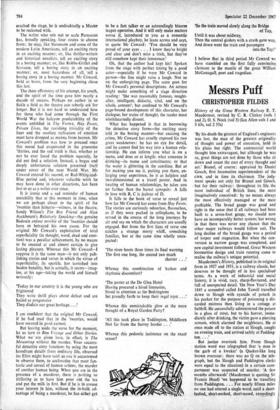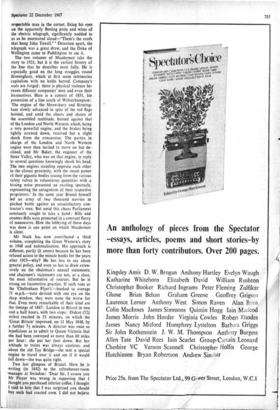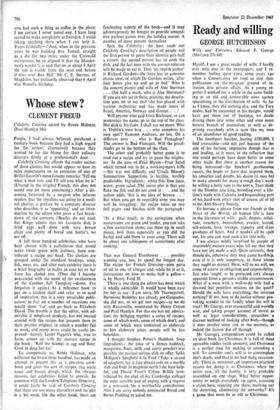Messrs Puff
CHRISTOPHER FILDES-
History of the Great Western Railway E. T. Macdermot, revised by C, R. Clinker (vols 1 and 2), 0. S. Nock (vol 3) (Ian Allen vols 1 and 3 63s, vol 2 55s) 'By his death the greatest of England's engineers was lost, the man of the greatest originality of thought and power of execution, bold in his plans but right. The commercial world thought him extravagant, but although he was so, great things are not done by those who sit down and count the cost of every thought and act.' Brunel, of course appraised by Daniel Gooch, first locomotive superintendent of the GWR, and in time its chairman. The judg- ment speaks not only for Brunel and Gooch, but for their railway: throughout its life the most individual of British lines, the most imaginatively conceived: by no means always the most effectively managed or the most profitable. The broad gauge was good and right in the sense that if all railways had been built to a seven-foot gauge, we should now have an incomparably better system; but wrong in that there was never any chance that the other major railways would follow suit. The long decline of the broad gauge was a period of torpor and stagnation. But when the con- version to narrow gauge was completed, and new capital investment followed, Great Western locomotive design and train running came to realise the railway's unique potential.
Macdermot's History, published in its original form in 1927 and 1931, is a railway classic, but deserves to be thought of -in less specialised terms. As a work of industrial and social history, it is vivid, racy, sharp-flavoured, and full of unexpected detail. 'On New Year's Day 1845 a scoundrel called John Tawell travelled down to Slough with cyanide of potash in his pocket for the purpose of poisoning a dis- carded mistress then living in a cottage. at Salthill. He successfully administered the poison in a glass of stout, but to his horror, imme- diately after drinking, the victim gave a piercing scream, which alarmed the neighbours. He at once made off to the station at Slough, caught an evening train, and arrived safely at Padding- ton. . .
But justice overtook him. From Slough station word was telegraphed that 'a man in the garb of a kwaker' (a Quaker-like long brown overcoat: there was no Q on the tele- graph, but the Slough and Paddington clerks were equal to the situation) in a certain com- partment was suspected of murder. 'A few months afterwards' (Macdermot is quoting Sir Francis Head) 'we happened to be travelling from Paddington. . . . For nearly fifteen miles no one had uttered a single word, until a short- bodied,-short-necked, short-nosed, exceedingly
respectable man in the corner, fixing his eyes on the apparently fleeting posts and wires of the electric telegraph, significantly nodded to us as he murmured aloud—"Them's the cords that hung John Tawell." ' Detection apart, the telegraph was a great draw, and the Duke of Wellington came to Paddington to see it.
The two volumes of Macdermot take the story to 1921, but it is the earliest history of the line that he describes most fully. He is especially good on the long struggles round Birmingham, which at first seem internecine capitalism with no holds barred. Company's seals are forged: there is physical violence be- tween different companies' men and even their locomotives. Here is a contest of 1851, for possession of a line south of Wolverhampton: 'The engine of the Shrewsbury and Birming- ham slowly advanced in spite of the red flags hoisted, and amid the cheers and shouts of the assembled multitude, bunted against that of the London and North Western, which, being a very powerful engine, and the brakes being tightly screwed down, received but a slight shock from the concussion. The parties in charge of the London and North Western engine were then invited to move on but de- clined, and Mr Baker, the engineer of the Stour Valley, who was on that engine, in reply to several questions knowingly shook his head.
The two engines standing opposite each other in the closest proximity, with the steam power of their gigantic bodies issuing from the various safety valves in voluminous quantities with a hissing noise presented an exciting spectacle, representing the antagonism of their respective proprietors.' In the same year Brunel himself led an army of two thousand navvies in pitched battle against an unsatisfactory con- tractor's men. But amid this chaos Parliament constantly sought to take a hand : Bills and counter-Bills were promoted in a constant flurry of manoeuvre. How the lobbying of those days was done is one point on which Macdermot is silent.
Mr Nock has now contributed a third volume, completing the Great Western's story to 1948 and nationalisation. His approach is different, partly (it seems) because he has been refused access to the minute books for the years after 1923—why? He has less to say about general policy, and even so has to draw exten- sively on the chairman's annual statements; and chairmen's statements are not, as a class, the most informative of sources. But he is strong on locomotive practice. If such runs as
the 'Cheltenham Flyer-s'—booked to average 71 m.p.h.—were devised with one eye on the
shop window, they were none the worse for that. Even more remarkable of their kind are the timings of 1847: London to Bristol in two and a half hours, with two stops: Didcot (52f miles) reached in 55 minutes, on which the `Great Britain' improved, on 11 May 1848, by a further 71 minutes. A director was once so injudicious as to admit to Queen Victoria that she had been conveyed at more than 60 miles per hour: she put her foot down. But her attitude to trains was always cautious, and about the old Tay Bridge—she sent a special engine to travel over it and see if it would fall down—she was quite right.
Two last glimpses of Brunel. Here he is writing (in 1842) to the refreshment-room manager at Swindon: 'Dear Sir, I assure you Mr Player was wrong in supposing that I thought you purchased inferior coffee. I thought I said to him that I was surprised you should buy such bad roasted corn. I did not belieVe
you had such a thing as coffee in the place; I am certain I never tasted any. I have long ceased to make complaints at Swindon. I avoid taking anything there when I can help it. Yours faithfully—: And, when in the previous years he was building Box Tunnel, straight as a die for two miles under the Cotswold escarpment, he so aligned it that (in Macder- mot's words) 'it is said that on or about 9 April the sun is visible from the west end before it rises over Box Hill.' Mr C. E. Stevens, of Magdalen, has brilliantly observed that 9 April was Brunel's birthday.




































 Previous page
Previous page